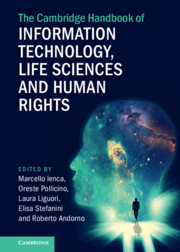Book contents
- The Cambridge Handbook of Information Technology, Life Sciences and Human Rights
- The Cambridge Handbook of Information Technology, Life Sciences and Human Rights
- Copyright page
- Contents
- Tables
- Contributors
- Acknowledgements
- Introduction
- Part I Life Sciences and Human Rights
- Part II Information and Communication Technologies and Human Rights
- 10 The Right to Internet Access
- 11 Face Recognition and the Right to Stay Anonymous
- 12 Artificial Intelligence and the Right to Algorithmic Transparency
- 13 Machine Learning, Cognitive Sovereignty and Data Protection Rights with Respect to Automated Decisions
- 14 Going Dark or Living Forever
- 15 Artificial Intelligence and Children’s Rights
- 16 Internet of Things Devices, Citizen Science Research and the Right to Science
- 17 Connected but Still Excluded?
- Part III Towards a Convergence
11 - Face Recognition and the Right to Stay Anonymous
from Part II - Information and Communication Technologies and Human Rights
Published online by Cambridge University Press: 17 May 2022
- The Cambridge Handbook of Information Technology, Life Sciences and Human Rights
- The Cambridge Handbook of Information Technology, Life Sciences and Human Rights
- Copyright page
- Contents
- Tables
- Contributors
- Acknowledgements
- Introduction
- Part I Life Sciences and Human Rights
- Part II Information and Communication Technologies and Human Rights
- 10 The Right to Internet Access
- 11 Face Recognition and the Right to Stay Anonymous
- 12 Artificial Intelligence and the Right to Algorithmic Transparency
- 13 Machine Learning, Cognitive Sovereignty and Data Protection Rights with Respect to Automated Decisions
- 14 Going Dark or Living Forever
- 15 Artificial Intelligence and Children’s Rights
- 16 Internet of Things Devices, Citizen Science Research and the Right to Science
- 17 Connected but Still Excluded?
- Part III Towards a Convergence
Summary
Freedom of expression and association are at once themselves fundamental human rights and also necessary for the promotion and protection of other rights. In many contexts, anonymity is essential for the realization of these rights, affording citizens the ability to speak without fear of retribution. Yet while there is a growing acknowledgement of the importance that anonymity plays in enabling free expression and association in the online world, debates about the right to remain anonymous in the physical world are lagging behind.
- Type
- Chapter
- Information
- Publisher: Cambridge University PressPrint publication year: 2022

